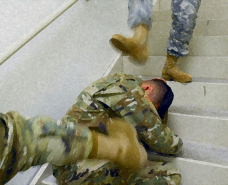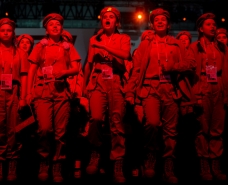How the Military Collects Data on Millions of High School Students

April 27, 2014 | 1:45 pm
This article originally appeared on VICE.
The calls started when I was a junior in high school — always in the evening, always after The Simpsons and always with an older gentleman on the other end of the line.
“Charles, there's someone who wants to speak you,” my mother would yell from the kitchen.
She showed no concern as she handed me the phone, no alarm in her eyes over all the calls she was getting from strange middle-aged men looking to chat up her vulnerable teenage son.
That's because these creepers called themselves “colonels” and “sergeants,” which lent authority to their predation. These men were military recruiters — and the bed they wanted to get me in was housed in some barracks.
A few weeks earlier, a uniformed Marine had come to my high school, set up an efficient little booth in the cafeteria and, in exchange for a stupid hat or a bumper sticker, convinced me and some other boys desperate to be men to give him our names and home phone numbers.
After that, at least once a week I had to deal with a recruiter calling me “dude” or “man” while promising that military service would allow me to see the world and sleep with many of its women.
I never did join up, but the recruiters kept calling—once they have your information, it's pretty hard to get them to admit defeat. And they have a lot of people’s information.
More than 30 million Americans between the ages of 16 and 25 have details about their lives stored in a Pentagon registry called the “Joint Advertising Market Research Studies” (JAMRS) database, their names, phone numbers, email addresses, ethnicities, and other identifying information available to recruiters 24 hours a day.
Since 2001, any school that receives federal funding is required under the No Child Left Behind Act to provide the Pentagon such data on all students in 11th and 12th grades, as well as grant recruiters access to their campus.
By filling out a form, parents can stop schools from sending information on their children to military recruiters. But the military has another means of getting that information: the Armed Services Vocational Aptitude Battery (ASVAB), an aptitude test that requires students to provide even more information than required by No Child Left Behind Act to recruiters.
Administered by the Department of Defense at over 12,000 schools, the ASVAB assesses a student’s fitness for both civilian and military careers; the score you get determines which branches of the armed forces you can join. In some school districts, taking the exam is voluntary, but in others it’s required, meaning teenagers have no choice but to give their personal information over to the US military.
If a student’s district is one that mandates the test be taken and the results forwarded to the Pentagon, there is no way to opt out, for either students or their parents.
The official Army manual for recruiters makes says the ASVAB is a treasure trove of useful material, noting that the exam provides the sort of information “not available from any other source,” such as “military aptitude composites, and career goals,” as well as “the most current contact information for each student.” Recruiters should encourage students to take the exam, the manual says, ostensibly “to help them prepare for postsecondary school or the job market,” but the real motive is generating “academically prequalified leads” and “the best potential prospects to contact.”
Schools have long been used as military recruitment centers—as training grounds, in fact, with “hundreds of thousands of secondary students” undergoing military instruction on high school campuses well before they can legally consent to enlist.

High school students in the Junior ROTC. Photo via Wikipedia Commons
“Our position is, in brief, that schools should not release person information about students to the military or anyone else without parental permission,” said Jeanne Leblanc, the spokesperson for the ACLU of Connecticut. As it is now, she told me, “Even when parents or a student over the age of 18 file a form instructing schools not to release personal information to military recruiters, the form doesn't apply to ASVAB test results or the accompanying personal information.”
In March, the Connecticut state education committee advanced a bill that would forbid schools from automatically handing the military ASVAB results or any information on those who take it. The 22 to 10 vote was along strict partisan lines, with every Republican voting no.
The law would have been a partial return to the 1990s, when Connecticut had a law barring schools from handing over student contact information to recruiters; that was overturned by No Child Left Behind, which included a provision that specifically overturned “Connecticut State law.”
After passing the committee, the bill, SB 423, should have been put to a vote in the Senate, where Democrats control 22 out of 36 seats, and then the general assembly, where they hold 98 of 151. In other words, Republican opposition couldn’t have stopped the bill from becoming law — but they didn’t need to, because the Democrats did that themselves.
“The Veterans' Affairs Committee met this morning and killed the bill,” said state Representative Jack Hennessy, the Democrat who chairs that committee. “To my knowledge, parents already have this ability to limit the dispersal of information and thought it unnecessary,” he said.
Hennessy is wrong — if students are forced to take the ASVAB by their school, parents have no way to stop the military from getting their information.
“Our understanding is that the military lobbied hard against it,” Leblanc told me. “While it's not unusual for a bill to be referred through multiple relevant committees, this bill was not relevant to Veterans' Affairs,” she added. “It's about student privacy and parental rights, not veterans.”
Connecticut would not have been the first state to ban schools from giving recruiters data from the ASVAB. Maryland and Hawaii have enacted statewide bans, while the nation’s largest school districts — New York and Los Angeles, as well as Oakland and San Diego — have likewise stopped administrators from automatically handing recruiters test results or any other information on students who take the exam, though a federal judge overturned voter-approved initiatives in California that would have barred recruiters from contacting minors.
The military has not been happy about the push to protect student privacy. At a March 10 hearing before the Connecticut Education Committee, Lieutenant Colonel Michael D. Coleman of the US Army Recruiting Battalion in Albany urged lawmakers to reject any restrictions on his recruitment efforts.
“When scores are not released to military recruiters, parents and students miss out on a valuable career exploration tool and may not receive information about opportunities available to them in a civilian career field or career in the military,” Coleman said, adding, “Participation… is voluntary and is not a ruse to gather personal information on students for recruitment purposes,” though he conceded that the Pentagon does of course “benefit from the enlistment eligibility information for military service.”
Coleman didn't convince any Democrats that day — at least, none on the committee — but his words may have persuaded those in leadership positions to put a halt to any reform.
“It's not a good day for transparency or democracy,” said Pat Elder, director of the National Coalition to Protect Student Privacy, when I asked him what he made of the Pentagon intervening in Connecticut politics to defeat a reform that, as of March, enjoyed significant support in the legislature.
Still, according to Elder's organization, 40 percent of Connecticut schools have already opted not to provide the military ASVAB data.
But as Coleman pointed out in his testimony, the “primary lead generation source for the military services” is not that data, but the directory information — names, addresses, telephone numbers — that No Child Left Behind requires schools to hand over, unless parents remember to opt their child out, which few do. (Many likely don’t even know it’s an option.) And even if that form is filled out by a student's legal guardians — in case you’re wondering, what the student wants doesn’t matter, as the law does not respect the agency of minors — the Department of Defense will still include in its recruitment database whatever information it can gather elsewhere on that student, unless yet another opt-out form filled out, in which case the Pentagon promises to delete what it has (though who really knows if it does or not).
If we want to protect young people in America, more needs to be done to protect them from military recruiters, who we know deliberately target teens with limited life experiences and few career opportunities in order to manipulate them into making a life-altering decision at the confused age of 17.
They devote years to this con and go about like any other predator, with the Army recommending that recruiters linger at all the “popular hangouts” and start young, noting that “establishing trust and credibility with students — even seventh- and eighth-graders — can positively impact high school and post-secondary recruiting efforts.” Meanwhile, all those blockbuster movies and desensitizing video games made with the direct assistance of the Pentagon ensure those 12- and 13-year-olds will have heard variations of the pitch long before they meet their first recruiter.
Since effectively doing away with the draft, the military has been forced to fill its ranks with volunteers. However, not many people are willing to kill for a bachelor's degree — and the wars in Iraq and Afghanistan have given potential recruits a reminder that military service is more than just a way to pay for college.
That has in turn forced the Pentagon to adopt data-mining tactics, using aptitude test results and racial and economic backgrounds to determine who is most likely to buy what it is selling.
But if the government is going to prohibit tobacco companies from marketing to young people, reasoning that such people are too immature to legally kill themselves with cigarettes, there's no reason the military can't wait until they are legal adults before it tries to kill them too.
Unfortunately, in our democracy, it appears the military gets the final say one what's appropriate.
Charles Davis is a writer in Los Angeles. His work has been published by Al Jazeera, Inter Press Service, the New Inquiry, and Salon.
Photo via Wikipedia Commons
Source: VICE
Countering Military Recruitment

WRI's new booklet, Countering Military Recruitment: Learning the lessons of counter-recruitment campaigns internationally, is out now. The booklet includes examples of campaigning against youth militarisation across different countries with the contribution of grassroot activists.
You can order a paperback version here.








